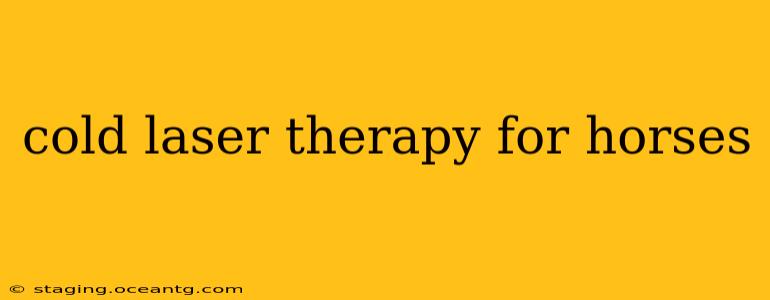Cold laser therapy, also known as low-level laser therapy (LLLT) or photobiomodulation (PBM), is increasingly used in equine veterinary medicine to treat a wide range of conditions. This non-invasive therapy uses low-intensity lasers to stimulate cellular repair and reduce inflammation, offering a potential alternative or complement to traditional treatments. This guide explores the benefits, applications, and considerations of cold laser therapy for horses.
How Does Cold Laser Therapy Work for Horses?
Cold laser therapy employs specific wavelengths of light to penetrate the skin and tissues. These photons of light are absorbed by the mitochondria within cells, boosting cellular energy production (ATP). This increased energy facilitates faster healing, reduces inflammation, and stimulates the production of collagen, a crucial protein for tissue repair. The result is a reduction in pain, swelling, and inflammation, accelerating the healing process.
What Conditions Can Cold Laser Therapy Treat in Horses?
Cold laser therapy has shown promise in treating a variety of equine conditions, including:
- Musculoskeletal Injuries: This includes strains, sprains, tendonitis, ligament injuries, and arthritis. The therapy can help reduce pain and inflammation, promoting faster healing of soft tissues.
- Wound Healing: Cold laser therapy can stimulate cell growth and improve blood circulation, leading to faster wound healing and reduced scarring. This is particularly beneficial for wounds that are slow to heal or prone to infection.
- Back Pain: Many horses suffer from back pain due to various causes. LLLT can help reduce inflammation and pain associated with back problems, improving comfort and mobility.
- Equine Laminitis: While not a cure, LLLT can be a helpful adjunct therapy to manage pain and inflammation associated with laminitis.
- Other Conditions: Some veterinarians also use cold laser therapy to treat nerve damage, ulcers, and certain skin conditions.
What are the benefits of cold laser therapy for horses?
Cold laser therapy offers several advantages over other treatments:
- Non-invasive: It's a painless procedure requiring no injections or incisions.
- No side effects: Generally, there are no significant side effects associated with cold laser therapy.
- Fast treatment times: Sessions are usually relatively short.
- Reduced inflammation and pain: It directly targets inflammation and pain at the cellular level.
- Improved healing times: It accelerates the natural healing process.
How is cold laser therapy administered to horses?
A veterinarian or trained technician will administer the treatment. The laser device is carefully applied to the affected area. The length of the treatment session varies depending on the size and nature of the injury. Multiple sessions are typically needed for optimal results.
Is cold laser therapy safe for horses?
Cold laser therapy is generally considered a safe treatment for horses when administered by qualified professionals. However, there are some contraindications, such as direct application over cancerous tissue, eyes, and pregnant uteruses. It's crucial to consult with a veterinarian to determine if cold laser therapy is appropriate for your horse’s specific condition.
How many treatments are typically needed?
The number of treatments required varies depending on the severity and type of injury. A veterinarian will determine the appropriate treatment plan, but typically, several sessions are needed over a period of weeks. The frequency and duration of treatment sessions will also depend on the individual horse and its response to the therapy.
What are the potential side effects of cold laser therapy for horses?
Side effects are rare, but some horses might experience temporary mild skin irritation at the treatment site. This is usually minor and resolves quickly. More serious side effects are highly unusual when the therapy is administered correctly by a qualified professional.
How much does cold laser therapy for horses cost?
The cost of cold laser therapy can vary depending on factors such as the clinic, the duration of the treatment, and the number of sessions needed. It's best to contact your local equine veterinarian for a quote.
Does insurance cover cold laser therapy for horses?
Insurance coverage for cold laser therapy varies depending on the specific insurance policy. It's best to contact your insurance provider directly to inquire about coverage.
This information is intended for educational purposes only and should not be considered a substitute for professional veterinary advice. Always consult with a qualified equine veterinarian before starting any treatment for your horse. They can assess your horse's condition, determine the suitability of cold laser therapy, and develop an appropriate treatment plan.
